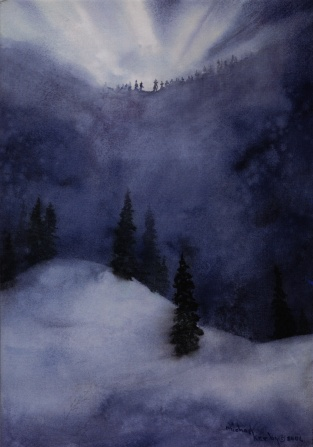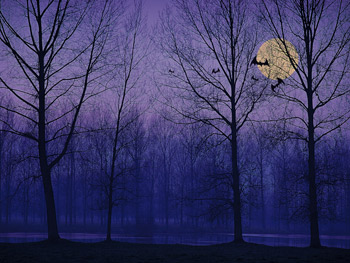

|
“If you only remember one thing about me after we say good-bye I hope it is this: All confusion, indecision, and suffering comes from fear of death. Ridyourself of it, and you will be free.” — Mark Salzman,
|
1 October 2010
|
||
|
What was he thinking? — Mohandes K Gandhi, born this day in |
2 October 2010
|
||
|
Our life’s work as humans: the transition from creating predictability and stasis for comfort to taking comfort in mystery, unpredictability, and faith in a larger benevolence of the universe. FFor followers of organized religion, this transition is made through a social group, and the faith is in doctrine received. But for those who prefer science, there exists another path to this same place: it consists in pursuing science to its endpoint, and appreciating the oceans of mystery that border the scientific islands of understanding. — Josh Mitteldorf |
3 October 2010
|
||
|
Pray for the achievable ‘Grant me the treasure of sublime poverty: permit the distinctive sign of our order to be that it does not possess anything of its own beneath the sun, for the glory of Thy name, and that it have no other endowment than begging.’ — Francis of Assisi is traditionally celebrated each October 4. |
4 October 2010
|
||
|
Comeuppance of the Robber-Barons When you mortgage your home, you actually sign over the title to the bank, making it easy for the bank to foreclose should you fail to meet your payment obligations. But what if the bank slices your mortgage into a thousand pieces and repackages them as mortgage-backed securities? Who then owns title to your house? Answer: MERS, the Mortgage Electronic Registration System. MERS is a Wall St dream — a company with enormous power, but with no responsibilities, and un-sueable because it nominally holds no assets. In the wake of the predatory lenders and a market crash, MERS is trying to foreclose tens of thousands of mortgages this year, but courts are finding that they don’t have clear title. There’s a downside to holding no assets. Believe it or not, people are actually able to stay in their homes because the Tycoons got too greedy when they drew up the corporate charter. This is a story that Ellen Brown has been following and explaining with grace, expertise, and a knack for making sense of what was designed to be confusing. Read here and here. |
5 October 2010
|
||
|
Intestinal flora The immune system knows they are there, and tolerates them because many of our foods can’t be digested without them. The immune system will zap bacteria in the stomach that don’t belong and can do us harm. In addition, the bacteria that are tolerated (even regulated) in the stomach will be zapped if they appear elsewhere - in the blood or the lungs. The immune system learns to recognize ‘self’ in the thymus. But intestinal flora are acquired, and can change through a lifetime. How does the immune system figure out which bugs are good for us and farm them in the intestinal tract, while eliminating others that are dangerous? ‘The immune system and commensal bacteria seem to have developed a
delicate balance, whereby the bacteria survive sufficiently well to
provided needed functions but do not expand to a point where they would
threaten the host (us). The exact basis upon which this balance is
achieved is still obscure but may involve modulating PRRs [pattern
recognition receptors on our immune cells] and PAMPs
[pathogen-associated molecular patterns] on the bacteria.’ |
6 October 2010
|
||
|
Politics! (sigh...) Could anarchy be worse? Even mentioning the word [anarchy] with a straight face is bound to put your acquaintances on edge, which is remarkable in itself. But, once they recover their senses from hearing the word pronounced out loud without a clap of thunder following on its heels, they will usually offer an argument against anarchism that rivals in its sheer stupidity any arguments that the flat-Earthers ever gave in antiquity. It usually goes something like this: Human nature is so intrinsically evil and depraved that, without cops walking the streets, judges locking up potheads, and politicians buying hookers and crack in Washington, the entire world would devolve into a horrifying bloodbath. Murder and rape would run rampant as soon as the “criminals,” (that is, all of us, as per our shared evil nature), got word that the police were no longer in the business of shooting, beating and incarcerating them. Virtually everyone and everything would be killed or destroyed in the ensuing mayhem. Cannibalism would probably even reappear for the barbaric survivors of the initial anarchic bloodbath. That’s right, cannibalism. So, as you can clearly see, the fragile fabric of society is held together ultimately by the simple police officer, whom we all take for granted, and whose life is spent deterring the innumerable “criminals” out there from butchering one another, like you and me. Without police officers, given human nature’s intrinsic depravity, life would indeed be “solitary, poor, nasty, brutish and short.” — from a blog by Mark Crovelli |
7 October 2010
|
||
|
Two look at two
— Robert Frost |
8 October 2010
|
||
|
“Men are afraid to rock the boat in which they hope to drift safely through life’s currents, when, actually, the boat is stuck on a sandbar. They would be better off to rock the boat and try to shake it loose, or, better still, jump in the water and swim for the shore.” The self is not something you find. The self is something you create. |
9 October 2010
|
||
|
A long story, short On his 278th birthday, he was healthy and strong. Far more robust, active and youthful than he had been 50 or (especially) 80 years earlier. The personal discipline, the blood treatments were a reliable foundation for wellbeing of indefinite duration. He trusted in the technology. He trusted in himself, and in his health. He realized with a start that this moment, right now was the first time in his long life that he was fully freed from the fear of mortality. The fog, evaporated. Clarity. Peace. He exhaled a sigh of relief, his last breath. — Josh Mitteldorf |
10 October 2010
|
||
|
Cars that drive themselves Apart from guis and social networks, computers can do some useful things. Computer-driven cars are already probably safer and more reliable than human drivers. This represents a triumph for vision programs that can parse two-dimensional images and construct objects in space. (One third of the human brain is dedicated to this task alone.) Google programs cars to drive themselves on hiways and in the city. Robot drivers react faster than humans, have 360-degree perception and do not get distracted, sleepy or intoxicated... The self-driving car initiative is an example of Google’s willingness to gamble on technology that may not pay off for years, Dr. Thrun said. Even the most optimistic predictions put the deployment of the technology more than eight years away. |
11 October 2010
|
||
|
Epiphany ‘A just expectation of life may include an expectation of moments that seem mysterious gifts from we know not where.’ — Robert Fitzgerald, whose hundredth birthday is today. Isn’t that how the gods used to appear to mortals out of the
radiant
Aegean air, |
12 October 2010
|
||
|
The inventor of the super-soaker water pistol has a new idea: a solar heat engine where heat from the sun is used to move hydrogen ions across a membrane, generating a voltage. He is aiming for efficiencies of 60% in conversion of heat to electricity, about twice what is possible with steam engines or internal combustion, with a mechanism that is simpler and cheaper than either. If he succeeds, it will make solar energy more than competitive with coal, and will replace the engines inside our cars as well. Article in
The Atlantic |
13 October 2010
|
||
|
Wonderful one times one if everything happens that can’t be done
one hasn’t a why or because or although
so world is a leaf so tree is a bough
now i love you and you love me
we’re anything brighter than even the sun — e e cummings, born this day in 1894 |
14 October 2010
|
||
|
Music is mystical Nietzsche’s first book, The Birth of Tragedy, dedicated to Richard Wagner, is constructed around the duality between the “Apollonian” and the “Dionysian.” Apollo stands for intellect, reason, control, form, boundary-drawing and thus individuality. Dionysus stands for the opposites of these; for intuition, sensuality, feeling, abandon, formlessness, for the overcoming of individuality, absorption into the collective. Crucially, Apollo stands for language and Dionysus for music. What, therefore, music does is to–as we indeed say–”take one out of oneself.” Music transports us from the Apollonian realm of individuals to which our everyday self belongs and into the Dionysian unity. Music is mystical. Since the human essence is the will to live—or for Nietzsche, the “will to power”—the worst thing that can happen to us is death. Death is our greatest fear, so that without some way of stilling it we cannot flourish. This is why musical mysticism is important. In transcending the everyday ego we are delivered from “the anxiety brought by time and death.” Through absorption into what Tristan und Isolde calls the “waves of the All,” we receive the promise and experience of immortality. — Julian Young, in an interview from Scott Horton’s blog at Harpers Nietzsche (born this day in 1844) was a friend of Richard Wagner, but few people know that he tried his own hand at composition. He wrote in the style of Schumann, and matched Schumann’s passion if not his musical genius. Listen ~ 17 Compositions of Nietzsche, with commentary ~ |
15 October 2010
|
||
|
Time (not the magazine) Bergson affirms that “experienced time,” or the time of our consciousness, is radically opposed to chronological time. The latter can be measured by scientific instruments and is basically a quantitative perception that assumes spatial attributes. Chronological time is perceived as a series of juxtaposed dots on a linear continuum. The basic opposition between durative and punctual time lies in the qualitative nature of the former impression, which is indivisible and integrative. Duration is a function of memory: a fusion of individual moments in which the past becomes assimilated into the present in an ever-changing dynamic structure whose total always exceeds the sum of its parts. The dynamics of this multitude of interconnected moments is what gives significance to experience; it is the principle that allows us to comprehend the sense or essence of things. — Roxanne Lalande |
16 October 2010
|
||
|
The best thing you can do for a friend is to enjoy him. Commentary: In other words, we all seek validation (confirmation of our individual worth)and find it, most commonly, in our capacity to enhance the life experience of the people we know and care for. This implies that there is no clear distinction between giving and receiving. Is it paradoxical that we give to a friend by derivng from him some material aid, or just simple joy in his companionship? Perhaps the message is that all our values are essentially communal, and that individual life acquires meaning from communal interaction. — Precept and commentary by Josh Mitteldorf “There is only one real deprivation, and that is not to be able to
give one’s gifts to those one loves.” |
17 October 2010
|
||
|
Would you fill out a questionnaire if God asked you to? As you’ve probably noticed, I’ve been a little absent from the world these last 2000 years or so. Sorry about that. I’ve been busy doing Godly things, you know, creating universes, being worshiped, punishing adulterers, that sort of thing. Anyhow, it’s now time to get back in the saddle, and to change things up a bit. This questionnaire explores your beliefs, and feeds back to you areas where there might be internal contradictions. |
18 October 2010
|
||
|
Reaping as we sow; sowing as we reap But yield who will to their separation, I first saw these lines quoted by Madeleine L’Engle when I read them to my daughters at bedtime twelve years ago. Frost’s words have grown with me. To live with no regard for the future is dissolution. To live in perpetual preparation for the future is, perhaps, the madness of modern Western culture. To alternate between periods of hard work and times of reward is a dissociation, an alienation which, though functional, is a form of spiritual sickness. The wholesome way to live is to bring the two together, not in compromise but in deep accord. The boundary dissolves. Work that feels good / play that sustains. Listen to the entire poem, read by the author, |
19 October 2010
|
||
|
Happiness Everything that we do and every decision we make is ultimately motivated by a belief that it will contribute to our own happiness. This is a proposition that I once believed fervently, until the TA in my Freshman philosophy class convinced me to question it. Is it an empirical proposition? Is it a normative statement about the way people ought to behave? Or is it tautological, a definition of happiness? If a tautology, the proposition must come to terms with the fact that the word ‘happiness’ has other connotations which don’t sit easily with what it is that seems to motivate people. Adam Phillips had a recent column in the Guardian, full of insight and wit, that helped precipitate another rethinking of my attitude toward happiness. Excerpts: Because happiness is not always the kind of thing that can be pursued, we should view it, more often than not, as a lucky side effect but not a calculable or calculated end. Making it such an end all too easily brings out the worst in us... Some people like being unhappy. Indeed for some people their lives can be construed as the pursuit of unhappiness. It is astounding the lengths to which some people will go to be unhappy, to contrive their own misery, as though happiness itself were a phobic object and held terrors. And we don’t talk of the right to be unhappy, when we should. Unhappiness can, after all, among many other things, be the registration of injustice or loss. At its best, a culture committed to the pursuit of happiness might be committed, say, to the diminishing of injustice; but at its worst, the culture of happiness may proscribe a whole range of feelings and perceptions... It is one of Freud’s more horrifying ironies that the pursuit of pleasure incites, calls up, the super-ego. And, of course, when and if pleasure is forbidden its pursuit requires punishment. There is no such thing as a free lunch. Virtue has to be its own reward. To pursue pleasure is to be pursued by punishment. There is no one more moralistic, more coercive, than a hedonist... ‘A people who conceive life to be the pursuit of happiness must be chronically unhappy,’ the anthropologist Marshall Sahlins wrote. For the punch line, you’ll have to read yourself. So by way of conclusion I want to suggest that a right to the pursuit of happiness is asserted when a capacity for absorption has been sabotaged, when there is a loss of confidence in people’s passions... |
20 October 2010
|
||
|
It all began... in 1198 when Muid ad-Din ibn al-Arabi exposed the gulf that separated Sufi mysticism from traditional orthodoxy. ‘Insight is obtained neither by the effort of rational philosophy, nor by conversion to what he was later to term a God created in dogmas. It depends on a certain decisive encounter, which is entirely personal, irreplaceable, barely communicable to the most fraternal soul, still less translatable in terms of any change of external allegiance or social quality. It is the fruit of a long quest, the work of an entire lifetime; al-Arabi’s whole life was this long quest.’ — Henry Corbin Read Namit Arora’s article at 3 Quarks Daily Every day people are straying away from the church and going back to
God. |
21 October 2010
| ||
|
Old wine in new caskets The 19th Century romantics were like rebellious teens, and they regarded Bach as an old stick-in-the-mud. Young Felix Mendelssohn appreciated Bach’s genius, and led a revival of his compositions, beginning with the first performance of the St Matthew Passion in a hundred years. Inspired by Bach’s oratorios to St Matthew and St John , Mendelssohn wrote two of his own. The St Paul, and Elijah oratorios have recitation and chorale movements that are derived directly from the Baroque style, but there are also lush, romantic melodies that are Mendelssohn at his best. Listen to this excerpt from St Paul, beginning with a short dramatic chorus, ‘Stone him to death!’, proceeding with a recitatif and a chorale, ending with a sweet, melodic chorus. |
22 October 2010
|
||
|
To be without some of the things you want is an indispensable part of happiness. ‘The human animal, like others, is adapted to a certain amount of struggle for life, and when by means of great wealth Homo sapiens can gratify all his whims without effort, the mere absence of effort from his life removes an essential ingredient of happiness. THe man who acquires easily things for which he feels only a very moderate desire concludes that the attainment of desire does not bring happiness. If he is of a philosophic disposition, he concludes that human life is essentially wretched, since the man who has all he wants is still unhappy. What he forgets is that to be without some of the things you want is an indispensable part of happiness.’ — Bertrand Russell (from The Conquest of Happiness) |
23 October 2010
|
||
|
Package deal? All the achievements of Western civilization derive from the idea that present satisfaction can be subjugated to future security. The fundamental derangement of the human experience due to Western civilization derives from the idea that present satisfaction can be subjugated to future security. — Josh Mitteldorf |
24 October 2010
|
||
|
Like Mozart, Bizet was a boy wonder whose music just got better and better as he matured. Unlike Mozart, Bizet was unappreciated in his lifetime, and died of a broken heart when the public rejected Carmen as a scandal. His miniature suite for orchestra, Jeux d’Enfants, so popular today, was not performed in Bizet’s lifetime. Listen to Le Bal, ‘Galop’ from this suite. Georges Bizet was born this day in 1838. |
25 October 2010
|
||
|
Turtles play. Also Komodo dragons. If animals are well-oiled machines, exquisitely crafted by natural selection for the single purpose of producing copies of themselves — then how do we account for play? Study of play in animals has been marginalized by serious scientific researchers, but evidence is finally emerging that there is a lot of it in nature. Researchers just shrug and say, ‘it must be adaptive, since we see it everywhere, but we don’t know what its purpose is.’ ‘Establishing dominance hierarchies’ is a popular hypothesis, but it seems to explain only some instances. Turtles don’t have dominance hierarchies. Read article
by Jeff Akst,
writing for The Scientist. My own guess is that it has something to do with maintenance of
diversity and behavioral plasticity. |
26 October 2010
|
||
|
Ambition Far better it is to dare mighty things, to win glorious triumphs, even though checkered by failure, than to take rank with those poor spirits who neither enjoy much nor suffer much, because they live in the gray twilight that knows not victory nor defeat. —
Theodore Roosevelt, born this day in 1858 |
27 October 2010
|
||
|
Under & Over Under a full moon |
28 October 2010
|
||
|
Nietzsche, on the process of writing ‘Zarathustra’ Has any one at the end of the nineteenth century any distinct notion of what poets of a stronger age understood by the word inspiration? If not, I will describe it. If one had the smallest vestige of superstition in one, it would hardly be possible to set aside completely the idea that one is the mere incarnation, mouthpiece or medium of an almighty power. The idea of revelation in the sense that something becomes suddenly visible and audible with indescribable certainty and accuracy, which profoundly convulses and upsets one—describes simply the matter of fact. One hears—one does not seek; one takes—one does not ask who gives: a thought suddenly flashes up like lightning, it comes with necessity, unhesitatingly—I have never had any choice in the matter. There is an ecstasy such that the immense strain of it is sometimes relaxed by a flood of tears, along with which one’s steps either rush or involuntarily lag, alternately. There is the feeling that one is completely out of hand, with the very distinct consciousness of an endless number of fine thrills and quiverings to the very toes;—there is a depth of happiness in which the painfullest and gloomiest do not operate as antitheses, but as conditioned, as demanded in the sense of necessary shades of colour in such an overflow of light. There is an instinct for rhythmic relations which embraces wide areas of forms (length, the need of a wide-embracing rhythm, is almost the measure of the force of an inspiration, a sort of counterpart to its pressure and tension). Everything happens quite involuntarily, as if in a tempestuous outburst of freedom, of absoluteness, of power and divinity. The involuntariness of the figures and similes is the most remarkable thing; one loses all perception of what constitutes the figure and what constitutes the simile; everything seems to present itself as the readiest, the correctest and the simplest means of expression. It actually seems, to use one of Zarathustra’s own phrases, as if all things came unto one, and would fain be similes: “Here do all things come caressingly to thy talk and flatter thee, for they want to ride upon thy back. On every simile dost thou here ride to every truth. Here fly open unto thee all being’s words and word-cabinets; here all being wanteth to become words, here all becoming wanteth to learn of thee how to talk.” This is MY experience of inspiration. I do not doubt but that one would have to go back thousands of years in order to find some one who could say to me: It is mine also!— — Friedrich Nietzsche |
29 October 2010
|
||
|
Halloween music Listen to October, by Eric Whitacre. |
30 October 2010
|
||
|
From here to Utopia What keeps us from coming together as one world, pursuing our common interest peaceably and efficiently? Is it endemic selfishness and greed that keep people from cooperating? Or is it legitimate, but irreconcilable differences in perspective that keep us from seeing eye-to-eye? I have come to believe it is neither of these things, but a deliberate web of deception and disinformation, keeping us in fear of one another, justifying unconscionable violence and the secrecy behind which thugs and gangsters operate within government. This is the good news: truth is a sufficient remedy. With or without democratic governance, the people will not tolerate illegitimate government, once they know the truth. This is the message of East Berlin and Czechoslovakia and Poland from the 1980s. It will work for the USA in the 2010s. (...with apologies to George Orwell, who figured this out the year before I was born; it has taken me so long to take his wisdom to heart.) — Josh Mitteldorf |
31 October 2010
|



























